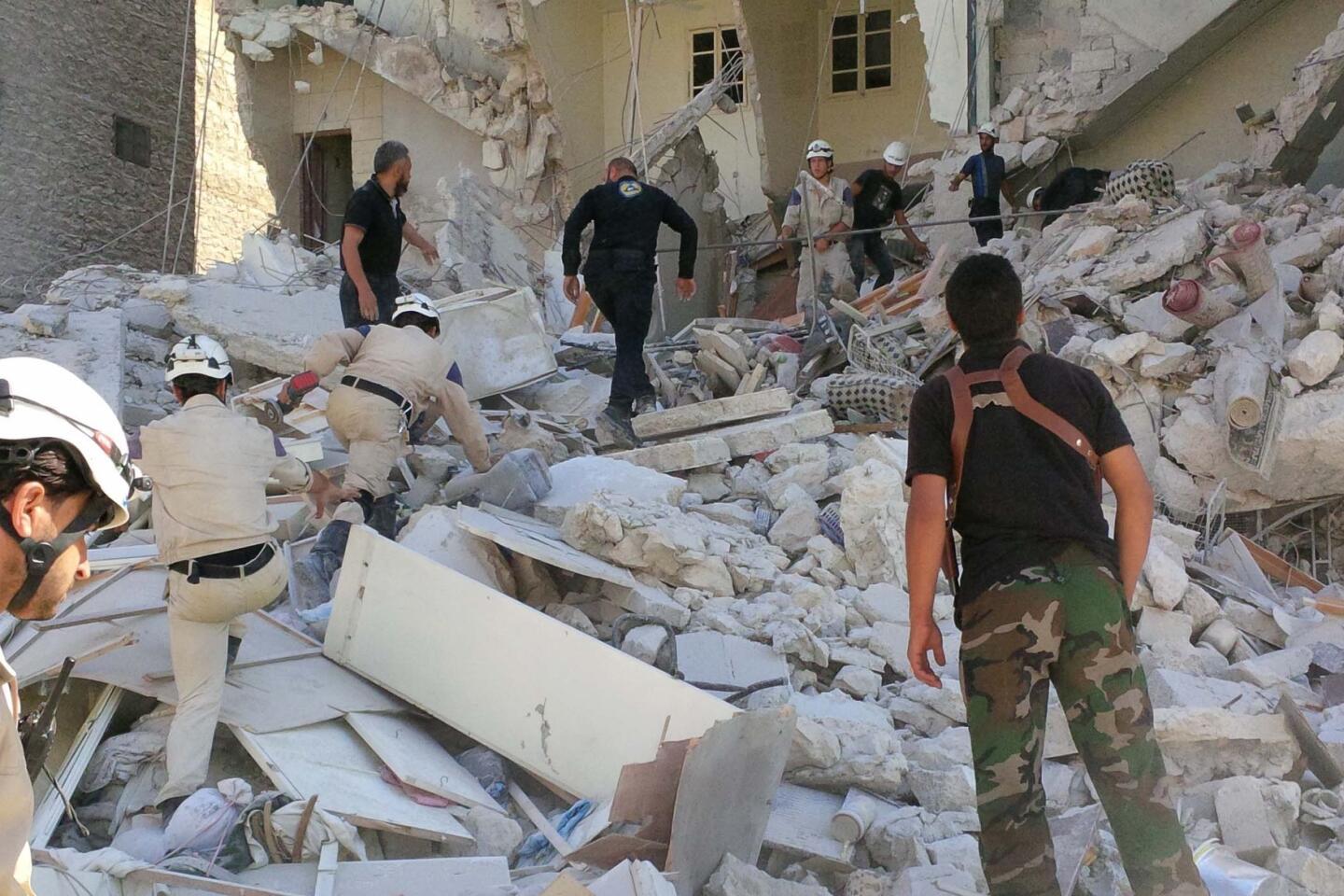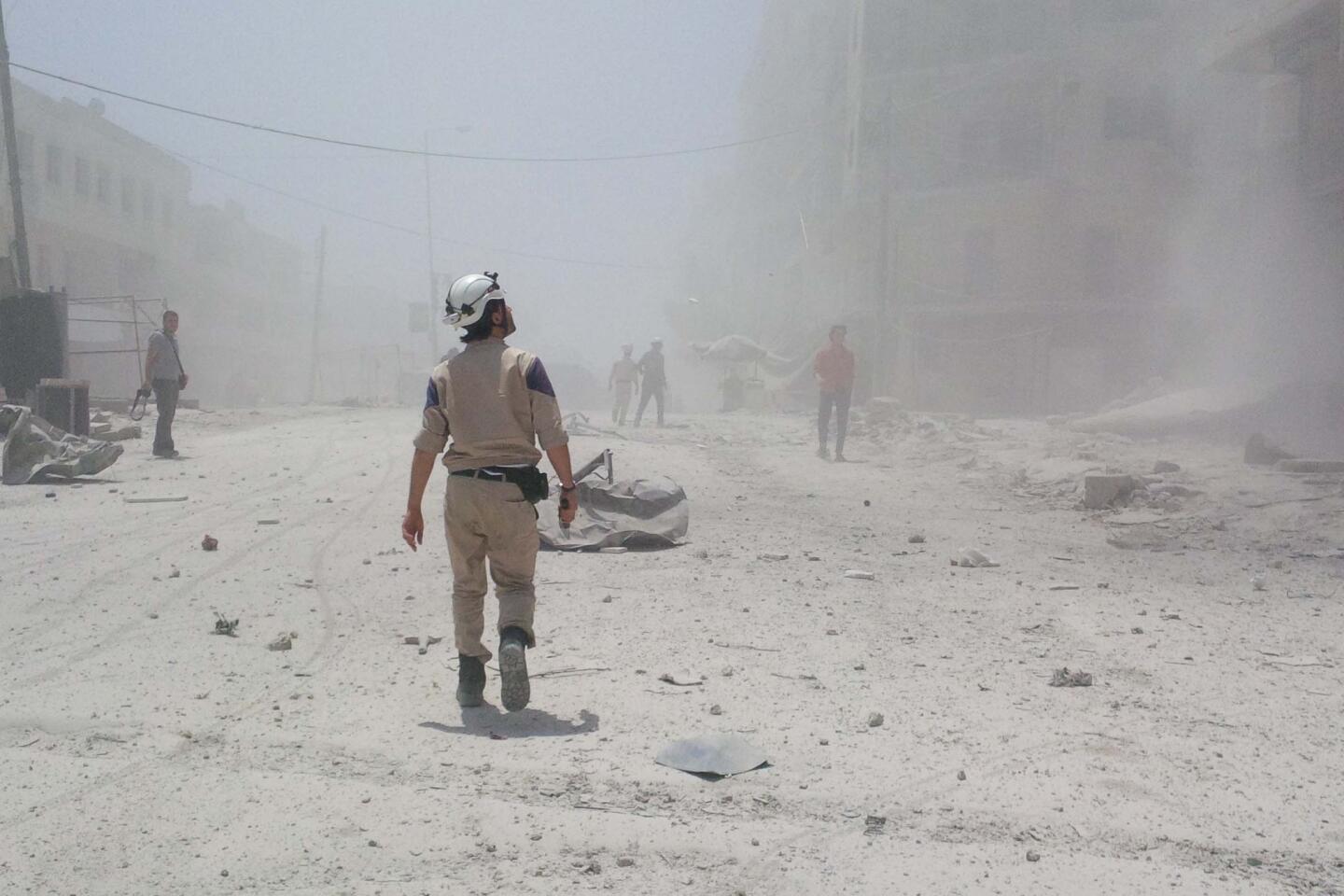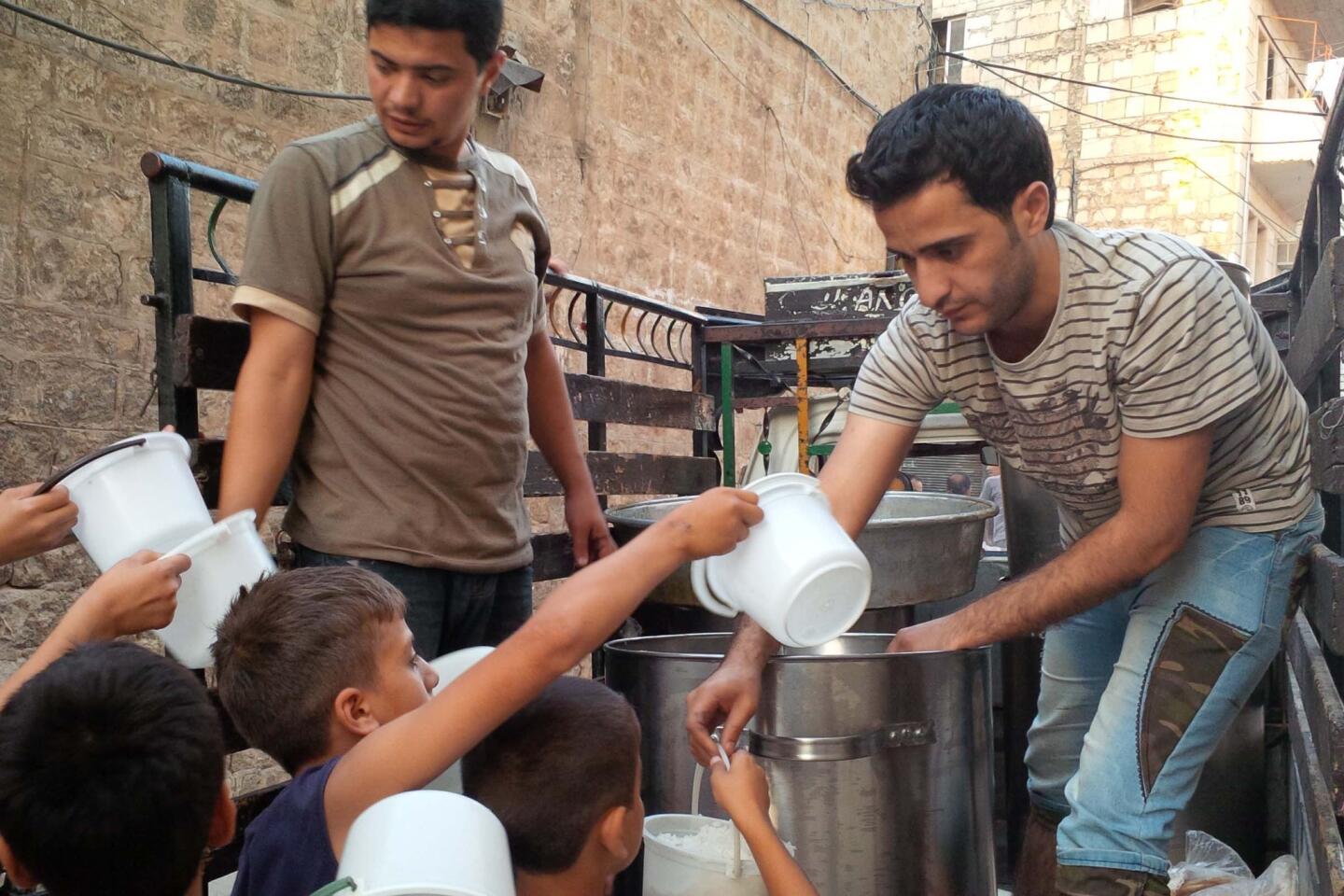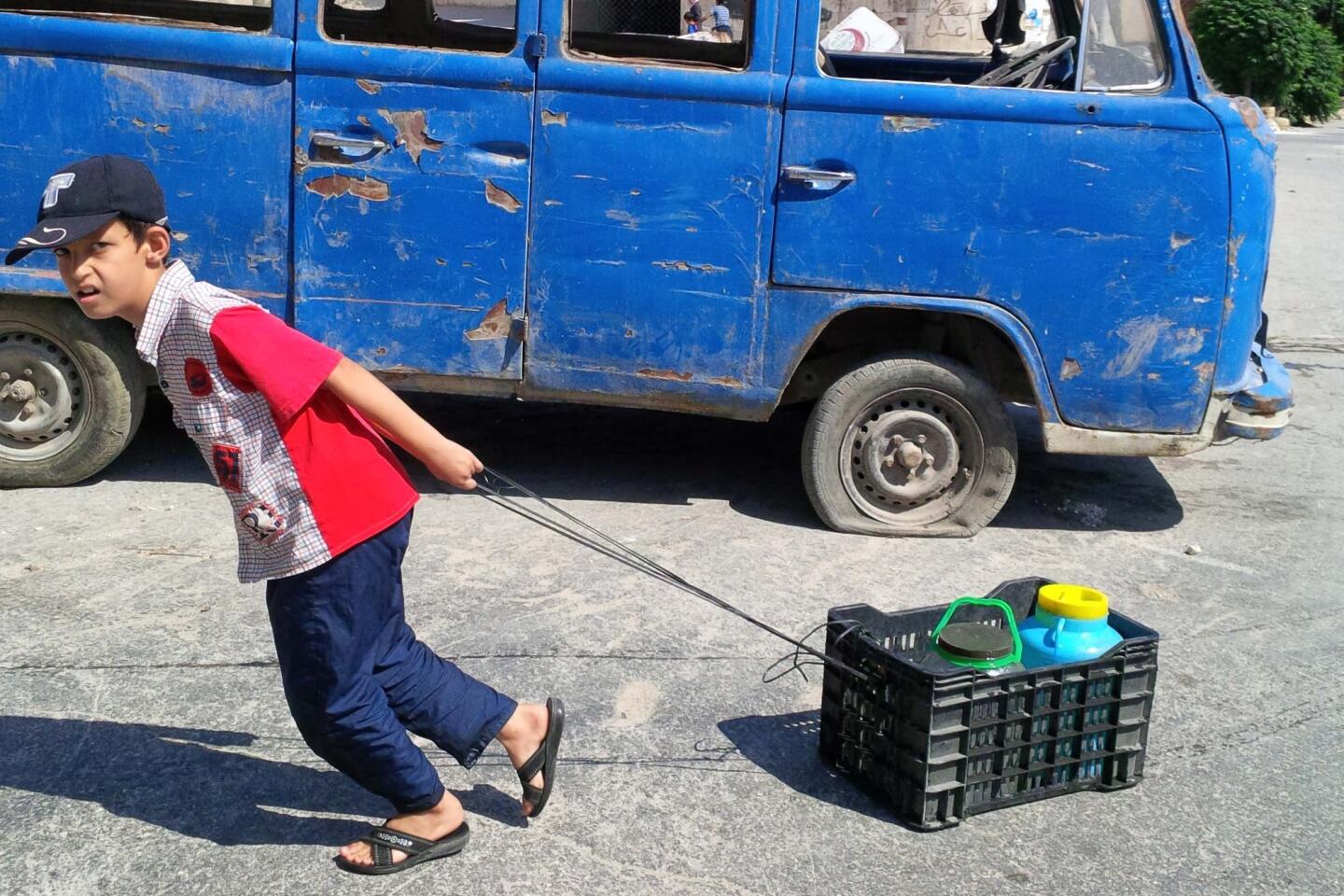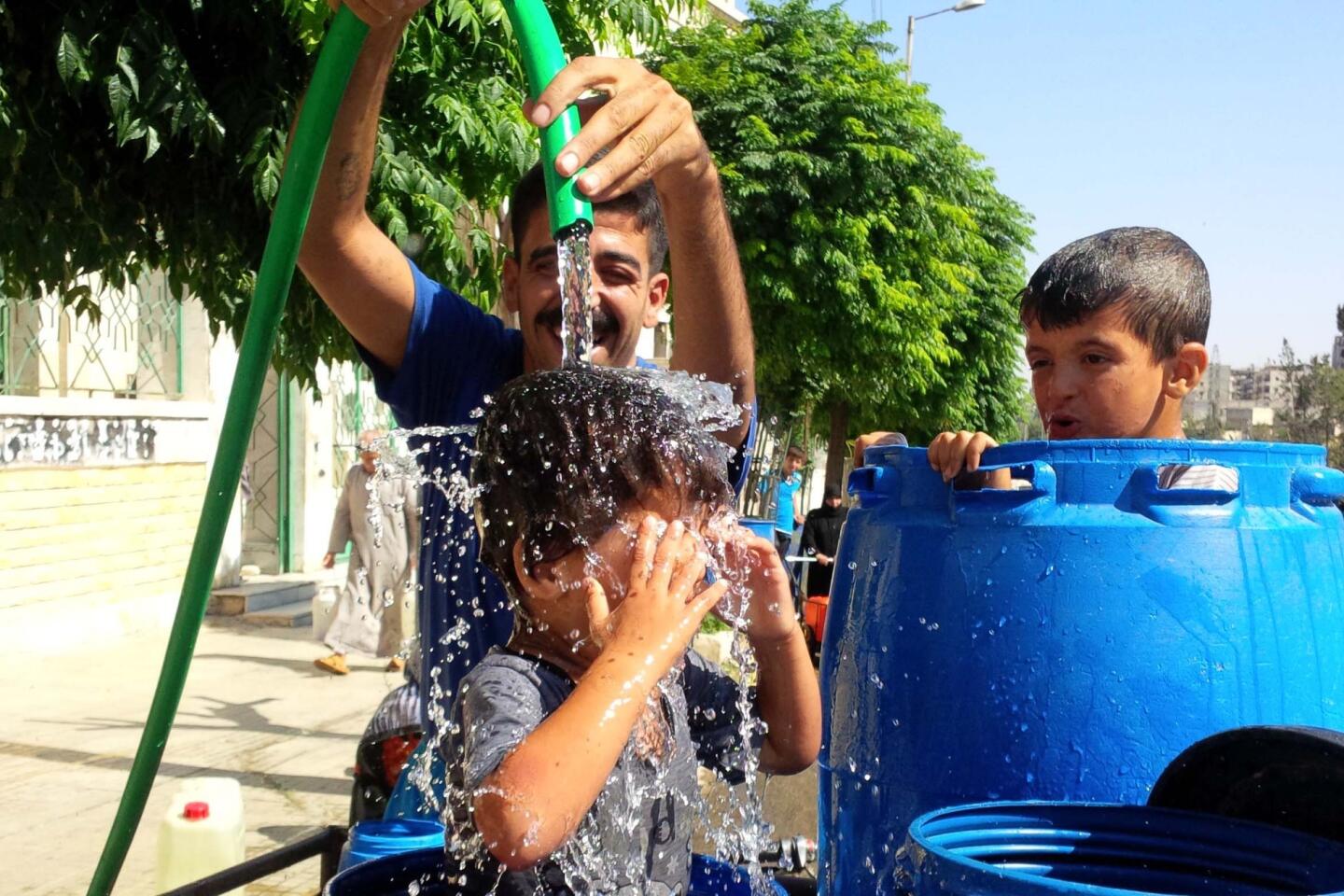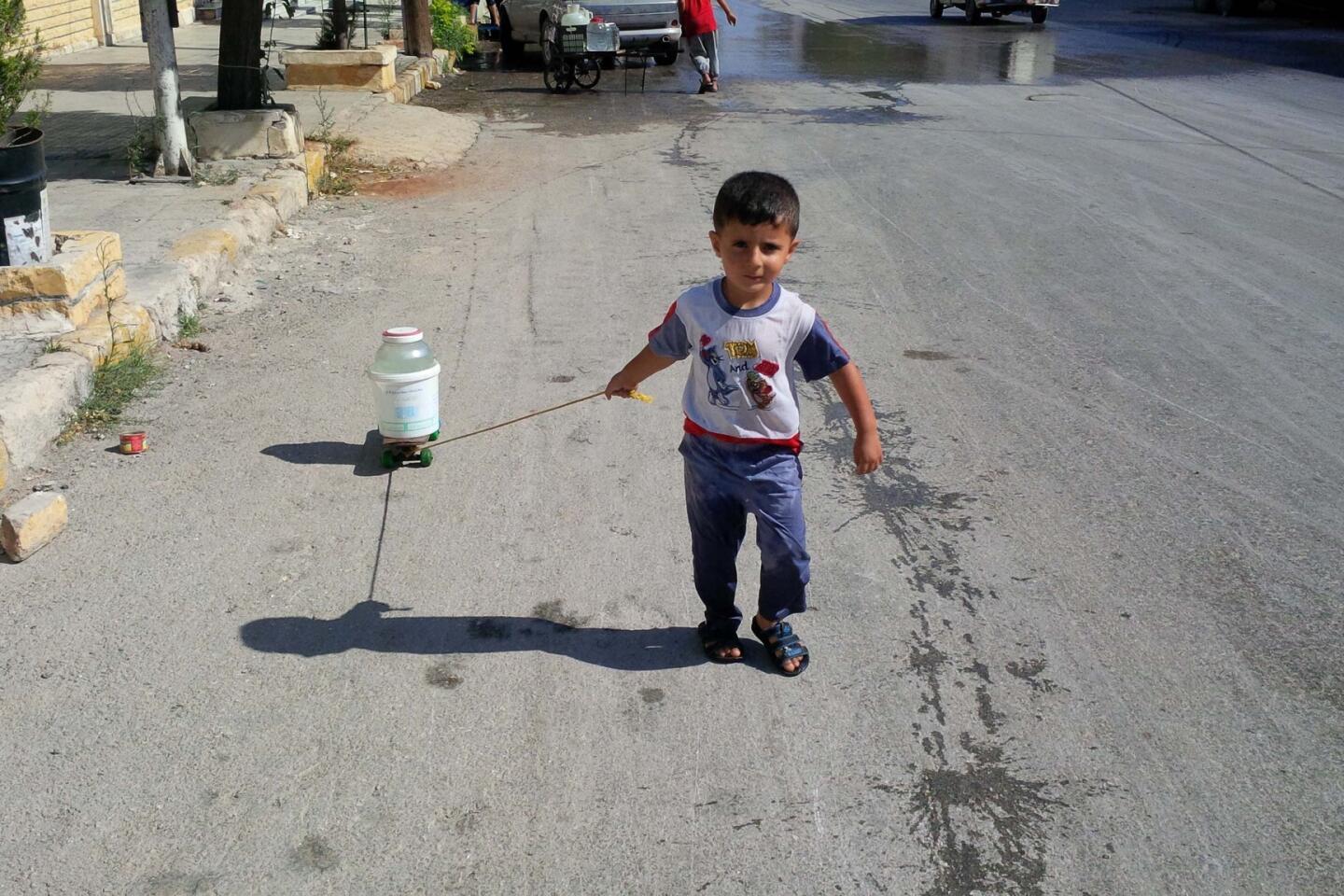Great Read: Syrians flee broken Aleppo as army closes in
- Share via
Reporting from Aleppo, Syria — Minutes after the barrel bomb eviscerated the crowded market, those still alive had to contend with matters of survival — and collecting what little remained of the dead.
A woman with tired eyes walked away cradling a bottle of water and a few onions like she would a baby. Her black abaya was almost gray from the dust and pulverized concrete. Behind her, her son held a small grocery bag full of the little they had bought before the oil drum filled with TNT killed at least 15 people.
“Oh my God!” a man on a motorcycle said as he stopped near a destroyed fried chicken restaurant.
His shock wasn’t over the human wreckage, but something more pragmatic in a city struggling to feed itself: “The chickens!”
As he spoke, another man walked up behind him, his outstretched arm gingerly holding a bulging black bag.
“Where are the body parts?” he asked.
Several bystanders pointed him to Persian rugs folded over one another to hide their contents. Half a leg and an arm had been collected in a wide-brimmed pan that moments earlier had been used to display freshly harvested vegetables.
Abu Karam, a rebel fighter, was helping to gather the body parts for burial. They had become accustomed to this hurried, bloody task.
“Yeah, yeah, this is Syrian meat,” he said angrily.
It was a rare moment of anger in Aleppo. Anger these days has been overtaken by exhaustion after months of intense air bombardments from emboldened government forces attempting to regain control of the entire city.
Just a few months ago, residents here tried to maintain some level of normality.
Now there is an exodus from a broken city.
::
It was a little past sunrise, and at intersections and roundabouts drivers of buses and microbuses yelled out a stream of destinations: Turkey, Aleppo’s government side, the countryside, even cities controlled by the extremist group the Islamic State.
Anywhere but here.
The only vehicles on the road at this hour, which usually offers a brief lull in the airstrikes, are full of people fleeing the bombs and the threat of a government siege, a lifetime’s worth of possessions strapped tightly atop buses and pickup trucks.
“Fear of the siege and fear of the barrels,” one man said, quickly explaining his reasons for leaving before jumping into a microbus headed for Manbij, a city under Islamic State control. “The barrels increased, and every day the government advances from here and from here.”
In an effort to replicate their success in parts of Damascus, the capital, and the central city of Homs, forces loyal to the government of President Bashar Assad advanced this month to retake Aleppo, once Syria’s commercial hub. Rebels say Assad is pursuing the same policy of submission by starvation.
Rebel reinforcements have come from neighboring provinces to help stave off the government encroachment, but the opposition has no antiaircraft weaponry to combat the air bombardment.
Life in Aleppo is marked by morbid calculations: At the sound of a helicopter, men light up to enjoy a cigarette one last time. As rockets strike nearby targets, a rebel places his car keys across the room: In case he is killed, why have the keys covered in blood?
At a Ramadan dinner in an abandoned textile showroom, opposition fighters throw pieces of chicken to stray cats that whine nearby. Later, they half-jokingly explain that it’s an attempt to fatten the animals up in case of a siege and they’re forced to eat the cats to survive.
Having witnessed the experience of Damascus and Homs, local opposition councils are stockpiling necessities: baby formula, flour and medicine.
Already though, water has become a scarce resource in all parts of Aleppo. The rebels and the government trade blame for the crisis, while others point to the Islamic State’s control of the Euphrates as the cause of the water supply disruptions.
In the Sakhour neighborhood, which has been without running water for nearly two months, a mosque pumps water from a well for two hours a day, or as long as the fuel in the generator lasts. A voice from the loudspeaker, usually reserved for the call to prayer or death notices, now announces, “Come fill up water.”
Ibrahim, a father of two, said the fault lies with both sides. Each time the government drops a barrel bomb or the opposition blows up a government building, the water supply is affected, he said.
“Only the civilians are being hurt,” said the former auto dealer, dressed in dirty capri pants and barefoot. “They all destroyed the country.”
On a recent day, hot like all the others, Ibrahim arrived at the mosque on a rickshaw, his father and 4-year-old son sitting beside him. On the back of the rickshaw were plastic tubs and buckets of various sizes. His 2-year-old daughter, Zahra, playfully peeked out of one of them.
As Ibrahim filled up, another man, Ayman, arrived with his son, Muhammad. Like many here, Muhammad had recently fallen ill from drinking contaminated well water, his father said. But there are no other options.
“What do you wish for?” Ayman asked his son.
“A siphon,” Muhammad answered, hanging on the handles of their cart like he would on the monkey bars at a playground.
“And what does your sister wish for?”
“A siphon.”
“They just want a siphon so that they can draw out the water.”
::
“Grab the injured first; leave the bodies for now,” Khalid Hijjo yelled from the back seat of the truck.
As the civil defense team careened through rubble-lined streets in its red first-responder truck, attacking each speed bump with little hesitation, driver Jameel Minahijji peered through a windshield cracked by previous airstrikes.
“Where, Abu Abdo?” Minahijji asked a bystander as he briefly slowed the truck and leaned out the window. The man pointed in the general direction of the Masaken Hanano neighborhood.
But when the team got there, the streets were abandoned and there was no one to ask where the barrel bomb had landed. The neighborhood had long since been emptied of its last holdouts.
“Where?” Minahijji asked no one in particular.
“Take a right,” guessed Sobhi Hussein.
“Here,” someone yelled, and they all jumped out of the truck, scrambling for signs of a recent attack amid remnants — pancaked roofs and sunken buildings — of so many others.
By this point, an ambulance had caught up with them. “Where?” the driver asked.
The men hopped back into the truck and kept frantically searching for fire or smoke or even a cloud of dust. When they couldn’t find anything, they consoled themselves by saying the bomb probably hadn’t killed anyone because everyone had already left.
“We don’t have the ability to know,” Hijjo explained as they drove back to the civil defense station, a repurposed middle school reeking of sweat and blood, indications of its former self — desks, books, models of human organs — relegated to forgotten corners.
While waiting for the next barrel attack, civil defense member Diya Badoor repeatedly flicked a switchblade open and shut.
“It’s gotten to the point where you hope to die,” he said.
“The most important thing is to die in one piece,” Hijjo said.
“Why does it matter? It’s all the same — your soul has left your body,” said Shahood Hussein, Sobhi’s brother.
“It’s not for me,” Badoor said, shaking his head. “But I don’t want you guys to get tired picking up all the pieces.”
More to Read
Sign up for Essential California
The most important California stories and recommendations in your inbox every morning.
You may occasionally receive promotional content from the Los Angeles Times.
